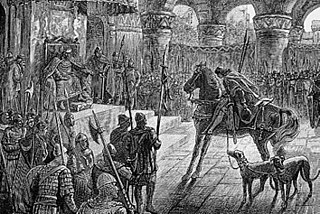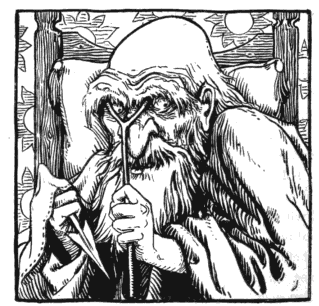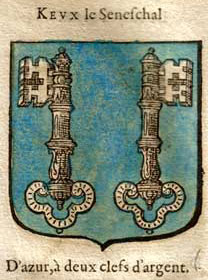
Excalibur is the legendary sword of King Arthur, sometimes also attributed with magical powers or associated with the rightful sovereignty of Britain. It was associated with the Arthurian legend very early on. Excalibur and the Sword in the Stone are in some versions said to be different, though in most incarnations they are the same. In Welsh, it is called Caledfwlch; in Cornish, Calesvol ; in Breton, Kaledvoulc'h; and in Latin, Caliburnus.

Mabon ap Modron is a prominent figure from Welsh literature and mythology, the son of Modron and a member of Arthur's war band. Both he and his mother were likely deities in origin, descending from a divine mother–son pair. His name is related to the Romano-British god Maponos, whose name means "Great Son"; Modron, in turn, is likely related to the Gaulish goddess Dea Matrona. He is often equated with the Demetian hero Pryderi fab Pwyll, and may be associated with the minor Arthurian character Mabon ab Mellt.

The Round Table is King Arthur's famed table in the Arthurian legend, around which he and his knights congregate. As its name suggests, it has no head, implying that everyone who sits there has equal status. The table was first described in 1155 by Wace, who relied on previous depictions of Arthur's fabulous retinue. The symbolism of the Round Table developed over time; by the close of the 12th century it had come to represent the chivalric order associated with Arthur's court, the Knights of the Round Table.
In Irish mythology, Goibniu was the metalsmith of the Tuatha Dé Danann. He is believed to have been a smithing god and is also associated with hospitality. He is thus related to the Welsh Gofannon and the Gaulish Gobannus.
Culhwch, in Welsh mythology, is the son of Cilydd son of Celyddon and Goleuddydd, a cousin of Arthur and the protagonist of the story Culhwch and Olwen. In this tale the etymology of Culhwch is explained as "sow run", but this is likely to be folk etymology. According to the narrative, Culhwch is born to his maddened mother Goleuddydd after she is frightened by a herd of swine. The swineherd finds Culhwch in the pigs' run, and takes him back to his father Cilydd. Culhwch is described as being "of gentle lineage".
In Welsh mythology, Olwen is the daughter of the giant Ysbaddaden and cousin of Goreu. She is the heroine of the story Culhwch and Olwen in the Mabinogion. Her father is fated to die if she ever marries, so when Culhwch comes to court her, he is given a series of immensely difficult tasks which he must complete before he can win her hand. With the help of his cousin King Arthur, Culhwch succeeds and the giant dies, allowing Olwen to marry her suitor.

Ysbaddaden Bencawr; "Ysbaddaden, Chief of Giants," is the primary antagonist of the Welsh romance Culhwch ac Olwen. A vicious giant residing in a nigh unreachable castle, he is the father of Olwen and uncle of Goreu fab Custennin.
Culhwch and Olwen is a Welsh tale that survives in only two manuscripts about a hero connected with Arthur and his warriors: a complete version in the Red Book of Hergest, c. 1400, and a fragmented version in the White Book of Rhydderch, c. 1325. It is the longest of the surviving Welsh prose tales.

Bedivere is one of the earliest characters to be featured in the legend of King Arthur, originally appearing in several Welsh texts as the one-handed great warrior named Bedwyr Bedrydant. In the French-inspired Matter of Britain, based on his portrayal in the Historia Regum Britanniae, Bedivere is described as being the Knight of the Round Table of King Arthur who serves as Arthur's marshal and eventually returns Excalibur to the Lady of the Lake. There, he is frequently associated with his brother Lucan and his cousin Griflet, as well as with Kay.

In Arthurian legend, Sir Kay is King Arthur's foster brother and later seneschal, as well as one of the first Knights of the Round Table. In later literature he is known for his acid tongue and bullying, boorish behaviour, but in earlier accounts he was one of Arthur's premier warriors. Along with Bedivere, with whom he is frequently associated, Kay is one of the earliest characters associated with Arthur. Kay's father is called Ector in later literature, but the Welsh accounts name him as Cynyr Ceinfarfog.

Tasciovanus was a historical king of the Catuvellauni tribe before the Roman conquest of Britain.
In Irish mythology, Cermait of the Tuatha Dé Danann was a son of the Dagda and brother of Aed and Aengus. He was killed by Lugh after he had an affair with Lugh's wife Buach. The Dagda cried tears of blood for his son, and later, while traveling with his son's body in the east revived Cermait with a healing staff. Cermait's three sons, Mac Cuill, Mac Cecht and Mac Gréine, avenged his death, and went on to become joint High Kings of Ireland. Another figure mentioned in the Dindsenchas, Conan Honey-mouth, is described as the son of the Dagda and may be the same figure as Cermait. Conan was killed with a spear by a son of Conall Cernach named Ferdoman.
Sanddef Pryd Angel is a figure of Welsh tradition. He usually figures as a warrior of King Arthur's court, and is distinguished by his great beauty, which gives him his epithet Pryd or Bryd Angel.
Sir Idris Llewelyn Foster was a distinguished Welsh scholar, and was most notably Jesus Professor of Celtic at the University of Oxford from 1947 until 1978.
Menw, son of Three-Cries, is a hero and shapeshifter in early Welsh literature, an "Enchanted Knight" of King Arthur at his court at Celliwig. He appears most prominently in the early Arthurian tale Culhwch and Olwen, in which he is handpicked among Arthur's warriors to accompany Culhwch on his quest to win Olwen. An "Enchanter Knight" of Arthur's court, he learned one of the Three Enchantments from Uther Pendragon. He is ascribed a son named Anynnawg.

Óengus mac Nad Froích (430-489) was an Eoganachta and the first Christian King of Munster. He was the son of Nad Froich mac Cuirc by Faochan, a British lady. In Geoffrey Keating's History of Ireland Oengus is given a reign of 36 years which would place the start of his reign as early as 453.

Robert John Reed, Baron Reed of Allermuir, is a Scottish judge who has been President of the Supreme Court of the United Kingdom since January 2020. He was the principal judge in the Commercial Court in Scotland before being promoted to the Inner House of the Court of Session in 2008. He is an authority on human rights law in Scotland and elsewhere; he served as one of the UK's ad hoc judges at the European Court of Human Rights. He is also a Non-Permanent Judge of the Court of Final Appeal of Hong Kong.

Edern ap Nudd was a knight of the Round Table in Arthur's court in early Arthurian tradition. As the son of Nudd, he is the brother of Gwyn, Creiddylad, and Owain ap Nudd. In French romances, he is sometimes made the king of a separate realm. As St Edern, he has two churches dedicated to him in Wales.
Glewlwyd Gafaelfawr; "Brave Grey Mighty Grasp," is a hero, warrior and porter in tradition and Arthurian mythology, in which he appears as a knight in Arthur's retinue and chief gatekeeper of his court. He is one of the earliest characters to be associated with Arthur and appears in a number of texts, including Culhwch ac Olwen, Geraint fab Erbin, Iarlles y Ffynnon, Pa Gur yv y Porthur and the Welsh Triads.
In the earliest prose stories in Britain in the Mabinogi, the Adar Rhiannon; "birds of Rhiannon", are specifically three magical birds, whose song can "wake the dead and lull the living to sleep". They also have a non-rational effect on space as they can be remote but seem very near. They are connected with Rhiannon the Queen of Dyfed who is thought to be a British euhemerized horse goddess, so part of Welsh mythology. The Adar Rhiannon were demanded by the giant Ysbaddaden Bencawr as a marriage task for Culhwch to complete. The giant wanted the Birds to soothe him as he faced his last night of life, prophesied as the consequence of his daughter's wedding.









